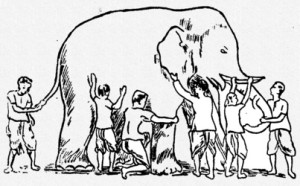 You have likely heard the fable about the blind men and the elephant. It’s a tale that’s told in many of the world’s religions as a means of explaining how everyone views the diety differently. One version of the story is told:
You have likely heard the fable about the blind men and the elephant. It’s a tale that’s told in many of the world’s religions as a means of explaining how everyone views the diety differently. One version of the story is told:
Six blind men were asked to determine what an elephant looked like by feeling different parts of the elephant’s body. The blind man who feels a leg says the elephant is like a pillar; the one who feels the tail says the elephant is like a rope; the one who feels the trunk says the elephant is like a tree branch; the one who feels the ear says the elephant is like a hand fan; the one who feels the belly says the elephant is like a wall; and the one who feels the tusk says the elephant is like a solid pipe.[Wikipedia]
What brought this to mind was a discussion we were having last week about the new Boy Scout requirements, particularly the ones at each rank relating to a Scout’s duty to God. “We are a religious-based organization” was one observation in justification of the increased scrutiny being placed on that aspect of our movement. “But we are non-sectarian” was one reply. “What about a troop that’s chartered to a church and all the Scouts are members of that church?” was another comment.
Everyone looks at religion from a different perspective, and applies it to Scouting from their own viewpoint.
- We require a belief in God (or some higher power), so we must be a religious organization.
- But our main aim is not to conduct religious services, so we’re not.
- We encourage prayer at various times, such as grace before meals and morning or evening vespers, so maybe we are.
- However, there’s no liturgy, adherence to scripture, or high holy days observed as part of our program, so it’s looking like we’re not.
- A Scout is Reverent, so there’s that aspect too. And now, it’s found more frequently in our rank requirements.
One thing in common, however, is the declaration of religious principle that we all agree to. But unless a specific faith is an integral part of the unit (such as in the Mormon church), the way we observe religion in Scouting is in a very general sense. Sure, we use prayer, but mainly in a manner that’s either non-denominational (recognizing the existence of a diety but without specific dogma) or polydenominational (where participants are each equally encouraged to share the customs and traditions of their own faith with all).
It’s beginning to look like religion in Scouting is like the elephant – it appears different depending on which angle you approach from. Clearly, our founder, Sir Robert Baden-Powell, intended for a Scout to observe his duty to God, but as a means to emphasize the building of character in youth:
The Scout, in his promise, undertakes to do his duty to his king and country only in the second place; his first duty is to God. It is with this idea before us and recognizing that God is the one Father of us all, that we Scouts count ourselves a brotherhood despite the difference among us of country, creed, or class. We realize that in addition to the interests of our particular country, there is a higher mission before us, namely the promotion of the Kingdom of God; That is, the rule of Peace and Goodwill on earth. In the Scouts each form of religion is respected and its active practice encouraged and through the spread of our brotherhood in all countries, we have the opportunity in developing the spirit of mutual good will and understanding.
There is no religious “side” of the movement. The whole of it is based on religion, that is, on the realization and service of God.
Baden-Powell was a Christian and forged his version of faith following Christian beliefs, but was careful to point out that Scouts should always respect the beliefs of others, even if they differ from their own, and not to consider others’ differences as an affront to our own beliefs. This makes it clear that Scouting is not of a single faith, but uses the tenets of all faiths to support and facilitate the rest of the Scout Law and the Scout Oath. Quoting Baden-Powell again:
Our objective in the Scouting movement is to give such help as we can in bringing about God’s Kingdom on earth by including among youth the spirit and the daily practice in their lives of unselfish goodwill and cooperation.
Our job as Scouters is to respect in each of our Scouts the belief in the higher power of their family’s custom, tradition and choosing. While we are not clergy and do not give such guidance, we can help each Scout discover for himself what it means to be Reverent by setting an example and applying the principles of faith to our everyday actions and deeds.
Image: jainworld.org
This post first appeared on Bobwhite Blather.



